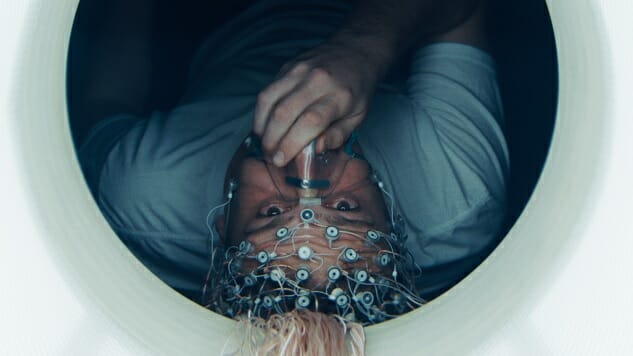The Discovery

Imagine that science has proven the afterlife. Imagine that we can say with 100% certainty that there’s a place beyond the physical world, and that all of us go there when we die. Now imagine that upon hearing this news, people all over the planet start offing themselves en mass, in hopes of getting to that place and escaping the wide-ranging, varied details of their lives: Their travails, their failures, their successes, their dreams, their nightmares, their joy, their pain, their losses.
That, in summary, is the stuff of Charlie McDowell’s The Discovery, except that instead of actually concerning himself with the profound ways the revelation of an actual, knowable hereafter might change humanity, he looks inward toward the existential moping of his two unremarkable and uninspired lead characters. The Discovery chafes for two reasons above all others: It wastes an absolutely fantastic premise, and it sends McDowell tumbling down a creative stairwell following his excellent 2014 debut, The One I Love, a film that’s similarly more fixated on people than plot, posing questions about identity and intimacy couched within romantic relationships. Structurally it’s loosey-goosey, a flick that gives off improvisational vibes, but that’s just fine: The One I Love works as an exercise in conceit above conflict.
The Discovery doesn’t. The Discovery, in point of fact, screams for discipline. This is a movie that demands to be plot-driven, and its opening minutes even suggest that it is: We learn right away that the afterlife exists, and we learn that Doctor Thomas Harbor (Robert Redford) is the man credited with the discovery. The film starts as he prepares to give a live interview with a TV journalist (played inexplicably by Mary Steenburgen), but they’re interrupted when one of her crewmen blows his brains out as the cameras roll. (It’s an uncomfortable moment in its own context, and also in context with the last year of cinema, which saw the release of not one, but two movies about Christine Chubbuck.) Why suicide? Why not! If there’s an afterlife, after all, then death loses all meaning we’ve ascribed to it throughout our species’ reign over the globe. Even murder isn’t really murder anymore, a notion explored in brief and summarily abandoned before the third act clumsily demands its reintroduction.
The moment the film looks poised to chew through the meatier concerns proposed through McDowell’s big central idea, it shifts gears dramatically (and in every sense of the word). We’re suddenly, forcefully stuck with Will (Jason Segel), Thomas’ son, a neurologist adorned with the same hangdog stare as every character Segel is hired to play. Will is traveling to the remote island town where Thomas is headquartered, intent on persuading his dad to tell everyone that he was wrong about the afterlife, believing that lying will end humanity’s suicide epidemic, as if that genie could be forced back into its bottle. In transit, he makes acquaintances with a woman named Isla (Rooney Mara), and later on saves, her despite her protestations when she tries to drown herself in the ocean. He’s a hell of a guy, that Will.
-

-

-

-

-

-

-

-

-

-

-

-

-

-

-

-

-

-

-

-

-

-

-

-

-

-

-

-

-

-

-

-

-

-

-

-

-

-

-

-








































